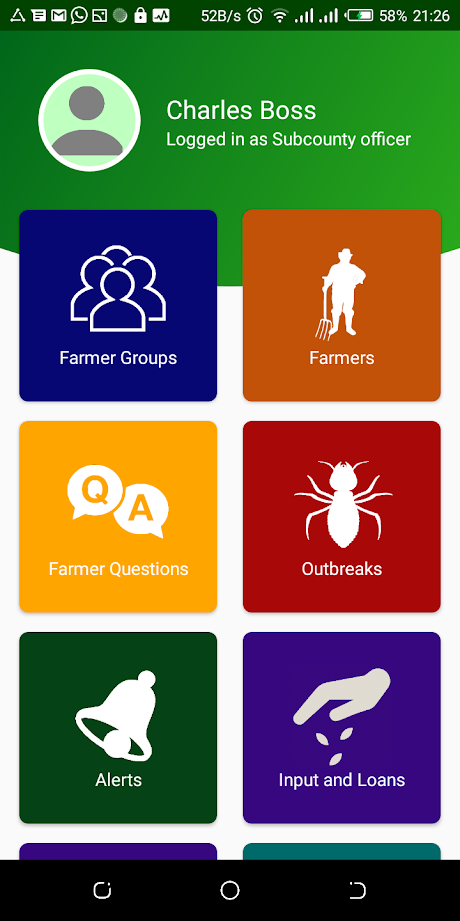Mobile Extension Services
We deploy a variety of mobile-based tools for efficient and effective extension service provision to the benefit of small-scale farmers in Uganda and beyond.
We deploy a variety of mobile-based tools for efficient and effective extension service provision to the benefit of small-scale farmers in Uganda and beyond.
M-Omulimisa mobile-based platforms currently reach 57,882 farmers in Uganda and Zambia, 42% of whom are women. These tools include; M-Omulimisa mobile App and toll-free SMS service.
The platforms enable farmers to exchange information with extension officers in their local languages for free.
M-Omulimisa Mobile App
The Mobile App supports extension service providers in the provision of interactive extension services. The app includes an agricultural information repository—in summarized text and illustrative graphics—that includes easy to use guides for farmers and extension agents.
The app provides accurate, relevant and up-to-date information on pests and diseases, good agronomic practices, post-harvest handling among others.
Additionally, farmers can use the App to ask agricultural-related questions (can even attach pictures of diseased plants/animals) in their local languages and receive feedback from their respective agents or technical M-Omulimisa staff and government extension officers who have been trained on how to use the platform.
The app also enables farmers and extension agents to report disease and pest outbreaks using geotagged pictures. The same mobile App enables village agents to profile farmers and their groups and aggregate farm-inputs demand to secure subsidized credit through our Group Input Loan Facility.
Toll-free SMS Service
Our Toll-free service provides a free medium of information exchange where farmers ask any questions related to agriculture in their languages, on any kind of phone, free of charge, and receive feedback from extension officers around the country.
Our extension service heavily relies on partnerships with existing actors in the agricultural extension ecosystem. We integrate within their traditional extension systems to improve their efficiency and effectiveness.
Some of our key partnerships include nonprofit organizations providing conventional agricultural extension services such as World Vision, Sasakawa Africa Association, and Government Ministries. We leverage their well-established networks with farmers and extension officers to mobilize and train farmers.
We train their extension staff how to use the platform and the trained extension officers then train their farmers as well as respond to farmers’ questions through the platform.

Mobile Extension System Statistics

We have over 20,000 registered farmers from 23 different districts and have received and responded to 12,000 questions in 10 different local languages. These languages include: Luganda, Acholi, Lango, Lusoga, Lugwere, Lunyole, Dhopadhola, Runyankore, Runyoro and Lumasaba. We have 325 registered extension officers but only about 100 are actively engaged in responding to farmers’ questions.
13,314
Farmer Registered
11,311
Questions Answered
14,000
Questions From Farmers
109
Ext-Oficer Registered
51
Districts Served
35%
Female Farmers
Other Services
Through partnerships with existing Micro finance institutions, and our network of village agents, we provide agricultural loans to farmer groups.
Available weather information sources usually provide data likely from a station that’s far away, rendering the data useless for local decision making.
AIC is a consortium of insurance companies providing subsidized agriculture insurance under the Uganda Agricultural Insurance Scheme (UAIS) a Public Private Partnership (PPP) arrangement with Uganda Insurers Association (UIA) and Government of Uganda.
Other Services
Our Village Agent Model follows a holistic approach – so it provides a variety of services such as inputs acquisitions, agricultural finance, production and marketing.
The platform uses our mobile application for data collection and is purposely built to improve the effectiveness, timeliness, and accuracy of data collection from rural areas where internet connectivity may not be reliable.


